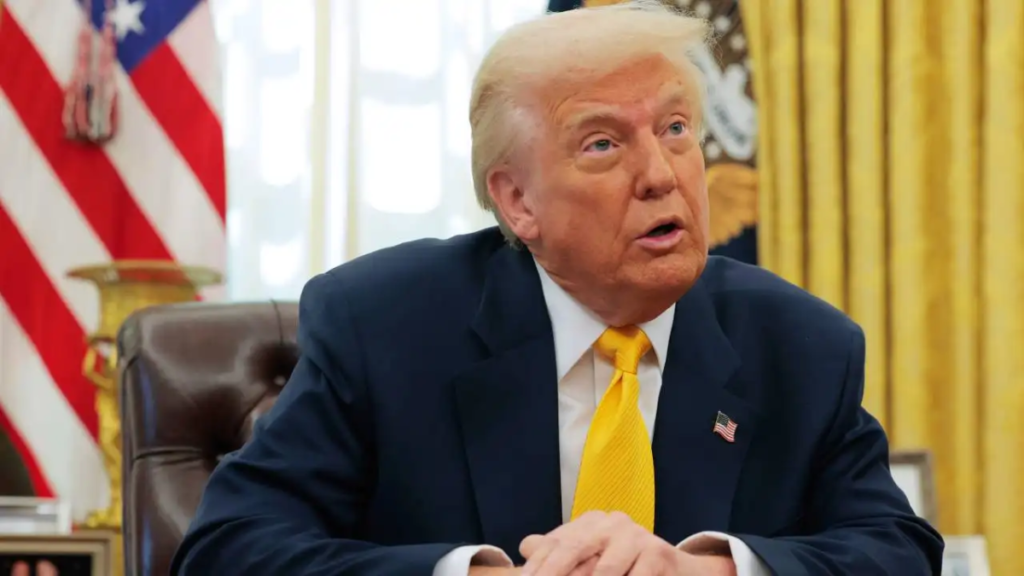Former President Donald Trump ignited a political firestorm after making a provocative statement during his speech at the National Rifle Association (NRA) convention in Dallas. Alluding to the possibility of a third term, Trump remarked, “FDR had four terms.
I wonder—are we going to be considered three-term, or two-term?” The offhand comment triggered widespread condemnation, with critics accusing him of once again testing the boundaries of the U.S. Constitution.
The comment draws attention to the 22nd Amendment, which limits presidents to two terms in office. Ratified in 1951 following Franklin D. Roosevelt’s four-term presidency, the amendment was intended to safeguard against the concentration of executive power.
Trump’s casual remark has now reignited a national conversation over democratic norms, presidential overreach, and the durability of constitutional checks and balances.
Though some supporters dismissed the statement as a rhetorical jab or satire, legal experts and political analysts say such talk from a former president—and potential 2024 candidate—is more than symbolic.
They warn that repeated challenges to foundational democratic principles can erode trust in American institutions.
Legal Scholars Warn of Dangerous Precedent
Trump’s remarks were immediately met with criticism across media outlets and political circles. The co-hosts of The View labeled the suggestion “insane” and “terrifying,” with co-host Sunny Hostin warning that the former president’s rhetoric reveals deeper intentions. “This is a man who incited an insurrection and now wants to disregard the Constitution,” she said.
Legal scholars were equally alarmed. Laurence Tribe, a renowned constitutional law professor at Harvard University, emphasized that even floating the idea of a third term could degrade public respect for the rule of law. “This is not just political theater. It’s a test of whether the public will tolerate talk of authoritarianism,” he explained.
Under current law, a third term would be impossible without a constitutional amendment. The process to amend the Constitution requires approval from two-thirds of both houses of Congress and ratification by three-fourths of state legislatures—a daunting task, particularly in today’s hyper-partisan political climate. According to experts, there is no indication that such an effort would gain traction.
Historical Lessons: Why the 22nd Amendment Matters
The idea of limiting presidential terms has deep roots in American history. George Washington set the precedent by stepping down after two terms, reinforcing the principle that no single individual should hold unchecked power. It wasn’t until Roosevelt’s four consecutive terms that concerns over the potential for autocracy took center stage.
In response, Congress and the states moved to enshrine term limits into law. The 22nd Amendment was ratified to prevent any future president from exploiting public support or political momentum to remain in office indefinitely. Today, this amendment is widely viewed as a critical safeguard of American democracy.
Trump’s remark, though perhaps intended to provoke or entertain, has unsettled many who see it as part of a broader strategy to undermine democratic norms and institutions. “If a leader can publicly challenge the Constitution without consequence, it sets a dangerous precedent for future administrations,” warned political analyst Rachel Bitecofer.
Could Trump Seriously Attempt a Third Term?
Despite the legal impossibility under current law, the danger lies not in a successful third term bid, but in the normalization of unconstitutional rhetoric. According to political scientist Norman Ornstein, “Even joking about violating the Constitution when you command millions of loyal supporters sends a signal that rules can be bent or broken.”
Polling shows that many of Trump’s supporters remain deeply loyal, with some willing to overlook institutional norms if they believe it serves a higher cause. That loyalty, combined with persistent misinformation about the 2020 election and claims of a “rigged” system, could result in a scenario where voters support extralegal actions.
Trump has yet to confirm if he will formally run in 2024, but if elected again and emboldened by loyalist support in Congress, the pressure to “remain” beyond constitutional limits could escalate. While legal experts insist the 22nd Amendment is not negotiable, history has shown that democracy requires constant vigilance to survive.

A Constitutional Crossroads
Trump’s flirtation with the idea of a third term is more than a political stunt; it’s a signal that core democratic principles are under pressure in today’s hyperpolarized environment. Legal boundaries that were once considered untouchable are now subject to reinterpretation, ambiguity, or outright challenge.
The 22nd Amendment was designed to uphold democratic turnover and ensure no individual could monopolize executive power. Trump’s remarks, whether serious or not, underscore the importance of defending these principles with clarity and conviction.
As America approaches another pivotal election cycle, the responsibility to protect democratic norms lies not only with lawmakers and courts, but with voters themselves.
For more historical context on the 22nd Amendment, visit ConstitutionCenter.org.
Disclaimer – Our team has carefully fact-checked this article to make sure it’s accurate and free from any misinformation. We’re dedicated to keeping our content honest and reliable for our readers.








